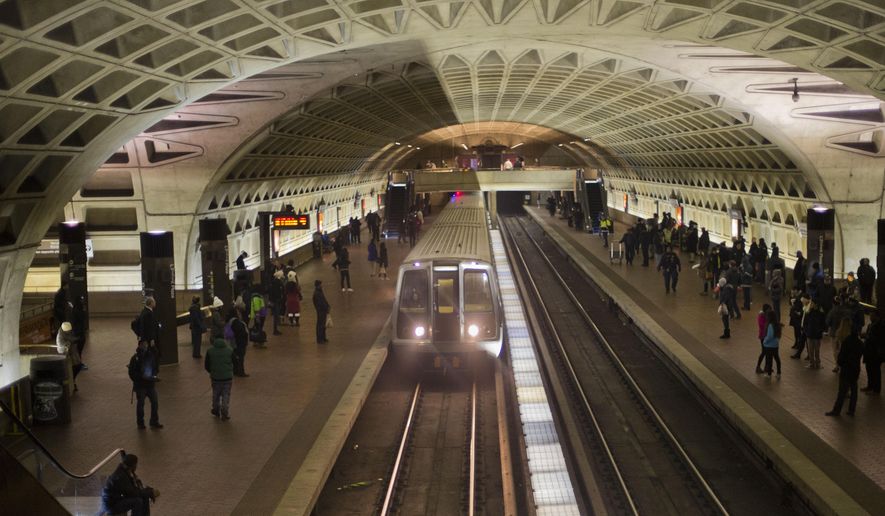ANALYSIS/OPINION:
With a $275 million deficit looming, Metro leaders and elected officials need to figure out how to close that shortfall, prevent another hole and raise additional revenue to cover future expenses.
That’s not going to be easy, considering the fact that all U.S. taxpayers pay for Metro whether they live in the region or not and whether they use Metro or not.
There is but one solution that must be considered first and foremost: Increase Metro fares and parking fees.
As things stand now, Metro Board Chairman Jack Evans is on record opposing fare increases, D.C. Mayor Muriel Bowser wants to raise taxes one-half cent, and the governors of Maryland and Virginia — Larry Hogan and Terry McAuliffe — are noncommittal (as they should be).
Meanwhile, congressional leaders warned Thursday: Keep your paws off the regular federal allotment of $150 million for short-term fixes.
SEE ALSO: D.C. leaders make pitch to world to attract business
So, our regional leaders are between a rock and a hard-line congressional place.
Mr. Hogan should hold tight to his state’s purse strings. As he pointed out Wednesday, “We can’t throw good money after bad.”
For his part, Mr. McAuliffe said: “They’ve got to get some things done before they come back and ask for more money.”
Miss Bowser and Mr. Evans, who chairs the D.C. Council’s Finance and Revenue Committee, also have to get some things done — and that includes slowing the city’s roll on tax increases, Circulator bus growth, and expansion of streetcar and bicycle programs.
For example, Circulator buses only serve D.C., yet it appears, based on media reports, that D.C. officials didn’t seriously consider the Circulator buses as a game night alternative — and those bus drivers just got a raise. Metro union workers are pushing for raises, too.
Once a D.C. tax increase is instituted for mass transit, it will never disappear. Tax-and-spend progressives and liberals love to spend your money, honey, without giving budget cuts much thought.
As for where Mr. Evans stands on fare increases and heeding the congressional warning about mixing operating and capital funds, he told our local Fox News-Channel 5 station: “I’m against raising fares, I’m against cutting service and I’m against using capital dollars for operating expenses. All are terrible financial approaches, as well as others suggested by my colleagues like selling buildings. Metro is in the trouble it is today because of short-term fixes. Look at a fare increase like a tax hike. You don’t raise taxes in a situation where the entity is in decline.”
Not quite the view of a fiscal conservative, but at least Mr. Evans articulates his point of view to the public.
Metro is a pay-as-you-go public transit system, and as such it needs to make some hard choices.
Motorists have to pay special costs for the special convenience to use HOV and HOT lanes, and toll bridges.
Motorists also have to pay for the rising costs of gas. (It seems motorists are the only folks paying their fare share.)
Bicyclists pay no special fees for the special convenience to use bicycle lanes.
Metrobus, Metrorail, MetroAcess and Circulator riders and Metro parking-lot users should pay special costs for the convenience provided to them.
Consider this, too: The cost of the pay raises for Circulator bus drivers will increase over three years. There’s no reasonable argument to make as to why Metro fares and rates cannot be developed and raised over, for example, a five- to seven-year period to get the Washington Metropolitan Area Transit Authority in the black.
Regional elected officials created Metro’s financial hole, and regional authorities are responsible for getting Metro out of the hole.
Metrorail safety problems won’t end with the SafeTrack maintenance program ends. The operating and capital needs of Metro won’t end when a new president moves into the White House and new congressional leaders are sworn in.
If our leaders are serious about making Metro a “world-class” transit system, they need to move fiscally and managerially in that direction.
• Deborah Simmons can be contacted at dsimmons@washingtontimes.com.
• Deborah Simmons can be reached at dsimmons@washingtontimes.com.




Please read our comment policy before commenting.